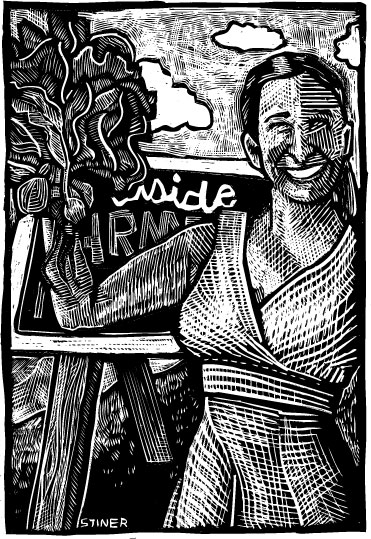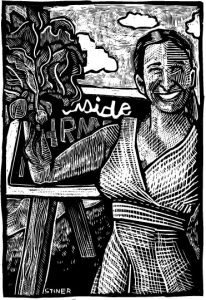
 Q: How have you seen the culture and environment of farmers markets change in the last few years?
Q: How have you seen the culture and environment of farmers markets change in the last few years?
Like the tastes, sounds and colors of communities are widely diverse, farmers markets are as well. There are markets with a festival ambiance where music moves patrons from one booth to the next, chatting and sampling, schmoozing and philosophizing. And there are cozy venues where quick stops with familiar faces and smiles offer a nice addition to dinner.
The beauty in the progression of the farmers market is that they are growing in number and scope, and finding communities who haven’t seen a local fresh produce market for generations. The small farmer is coming out of the shadows as the unfortunate son or daughter who’s only option was to inherit the farm, to a local supplier of LIFE! The tradition of farming is seen as great again.
Q: To you, what is the importance of bringing children to the markets? How does showing them and having them experience a market have an impact on their future buying habits?
We lost a generation to exclusively supermarket buying and we saw the error in our ways. We lost a connection to our food but It’s much bigger than that. The simple act of seeing dirt on your vegetables connects it back to the ground, it’s origins, to an amazing living system. Science classes, summers in the mud, and eating a tomato can all be linked in a child’s brain and lead them to a more balanced, healthy, and well connected lifestyle.
Our traditional supermarket buyers of conventional produce have also been stripped of the pleasure of tasting fruits and vegetables ripened on the vine to the peak of it’s sugary goodness while appreciating the bumps, bruises, and insect nibbles that prove it’s perfectly ripe! The National Resources Defense Council says 40% of the food available to Americans is discarded due to imperfections. The movement for the “ugly” food is forming and exposing children to imperfections will be crucial to reducing our food waste.
And the unique… Carrots with the tops on, ground cherries, kohlrabi, watermelons with seeds, sorrel, and beets with colorful greens may be an oddity to kids, and exposure to the “unusual” will move these to commonplace. Picky eaters may find a world of foods they never imagined!
Education, experience, and pleasure, drive our purchases as adults and all these began taking hold as children.
Q: Describe the vibe/buzz/feeling of the WSFM.
We love doing the Westside market. The eclectic group of people never fails to be the catalyst for sharing ideas, trying new things, and boosting the value for everyone at the market. Zingermans sets a great tone for buying produce. The aroma of BBQ and pulses of live music invite the visitor to stay, hang out, chat with a new friend, and taste something delicious!
Q: What does being a local farmer mean to you?
Farming is bringing life to people! There is no greater way to spend your time.
Q: How were you first exposed to farming? Grow up on a family farm or did it come later in life?
Like many, I grew up with grandparents who farmed as youth, but were hobby gardeners as adults. Their passion and love of growing and preserving their own food rubbed off. As a kid, playing in the dirt and then enjoying tomatoes, apples, cucumbers and peppers from the garden was a fantastic way to spend the day. As an adult, I cultivated that love and developed the skills and opportunity to farm.
Q: Can you describe the eco-farm a bit more to me?
Robin Hills Farm, LLC, is a new eco-destination farm that uses organic growing and sustainable building methods to both showcase and instruct on sustainable practices, incorporating new, innovative growing methods along with traditional ones.
Among the intended offerings are: 1.) a recreational space for hiking, biking, and fishing, for families and community members to experience and enjoy the outdoors, 2.) a special events facility that will function as both an educational facility and for the community to rent for limited group functions and events, and 3.) a main building overlooking the pond that will accommodate a small café and retail/produce space featuring local Michigan products.
Currently, Robin Hills Farm provides educational classes and events for the community to enjoy, and we receive support from the community through our Community Supported Agricultural (CSA) program. Our greatest hope is to create a space for the community to not only enjoy and relax in, but to learn along the way as we strive to build a more interdependent and sustainable world through education and empowerment.
Robin Hills Farm’s mission is to provide an experience that educates and fascinates our community. Our farm will serve as a model of sustainable, organic agriculture & appropriate land stewardship. We provide opportunities to participate in responsible environmental leadership, growing organic food, & fostering a sense of community, while working together & enjoying nature. Location: 20390 Stockbridge Chelsea Road, Chelsea, Michigan 48118.
